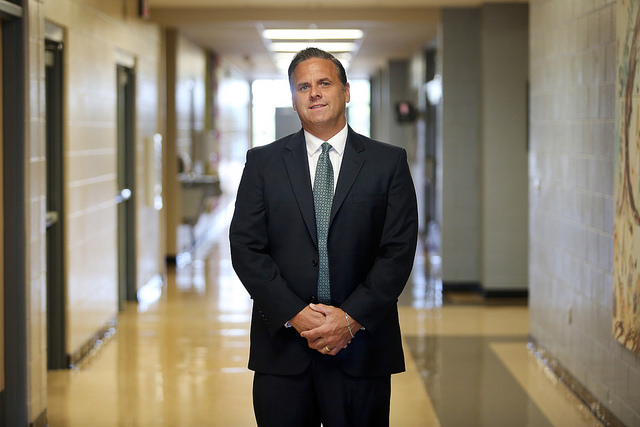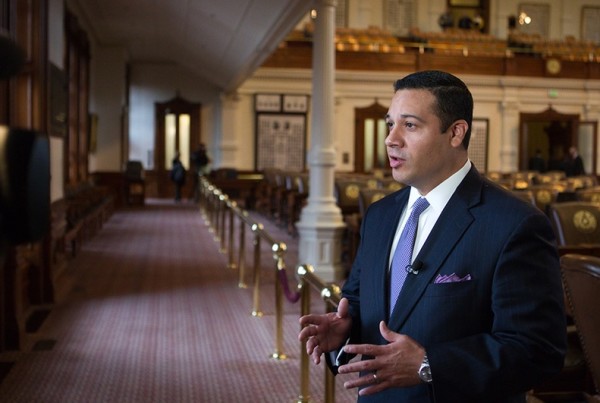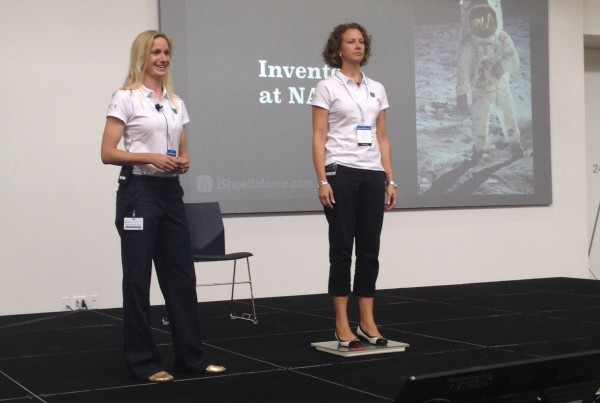This story is part of “Austin’s Eastern Frontier,” a project by KUT, the Austin Monitor and KLRU. This series takes a closer look at Manor’s growth – and the challenges it presents for the town.
Inside a small building off Highway 290 in Manor, dozens of high school juniors are sitting in classrooms. But they aren’t learning English or math. In one classroom, students are building circuits. They’re getting their mechatronics certification, which can be used for various engineering and mechanic jobs. In another room students practice using PCs without a mouse as they work toward their PC technician certification.
Down the hall, another group of students sits in rows wearing scrubs. They’re reviewing lessons with their teacher to become certified nurse aides.
These students are part of a new partnership between Manor ISD and Austin Community College. Right now, more than 200 students are spending one or two years working to get one of six certifications that can be used to get higher paying jobs directly out of high school.
“When you leave high school, you don’t have to go to Sonic and flip burgers,” says Catherina Okoro, a junior getting her medical assistant certification. “You can go straight to the hospital and see if they can apply you there. You can start working, getting experience, see if what’s you want to do.”
Even though these certifications don’t require a bachelor’s degree, Okoro wants to go to college. Other students, like Mark Zuniga, agree.
“I feel like going to college is something I want to do and need to do to get a better job,” says Zuniga, who is in the mechatronics class.
While many students say they want to go to college, Manor ISD Superintendent Kevin Brackmeyer provides a dose of reality.
“I wanted to play for the Dallas Cowboys, right? Didn’t make it,” says Brackmeyer. “There had to be some reality check there; at some point you realize I’m not going to make it there.”
Last year, only 51 percent of high school graduates in Manor ISD directly enrolled in college after high school.
“I believe everybody can go to college and everybody can graduate from college, but it’s not for everybody,” Brackmeyer continues. “I think we’ve done a lot of students a disservice by telling them that if you don’t go to college you’re a failure.”
Brackmeyer says it keeps him up at night to think about the students who graduate high school, but don’t really have a plan afterward. He believes the certification program is one solution.
“We just saw this as, ‘Gosh we’ve got to give them something they can fall back on,’ and not have to resort to working, at best, at minimum wage or falling into some very serious cracks that would cause them to not make it out of here.”
This issue is only becoming larger as Manor ISD’s student population grows. Brackmeyer has to figure out how to give more and more students something to fall back on. Last year, 78 percent of Manor students were considered low income by the state. Statistically, those students are less likely to enroll and complete college.
“For a lot of students who come from well-to-do homes, two parents, parents who are engaged, a good support system, they have a lot going for them, and so there’s a lot of help there,” Brackmeyer says. “In a district such as Manor ISD where there is a lot of poverty, that isn’t always the case.”
But if you look at the Austin region as a whole, getting more kids to enroll in college still seems to be the goal—at least in the business community. This fall, the Austin Chamber of Commerce and nine school districts, including Manor, pledged to increase the regional college enrollment rate to 70 percent by the end of this school year. Brackmeyer signed the agreement. But he says that raises another question:
“Let’s say 70 percent go to college. What happens to the other 30 percent?” Brackmeyer asked. “We’re just kidding ourselves if we just say, ‘Oh, the expectation is you go to college.’”
Plus, enrolling in college doesn’t guarantee students will finish.
Now that the certification program underway, Brackmeyer’s next challenge is helping the students who don’t plan to go to college, but aren’t pursuing a certification. Brackmeyer hopes this first class will show the benefits of getting a certification.
“You got a group of kids who are starting out and we expect to be, hopefully, the trendsetters for the high schools and say, ‘Hey, this is another avenue you can take, and it’s working out well.’”
Read more on the project website.















